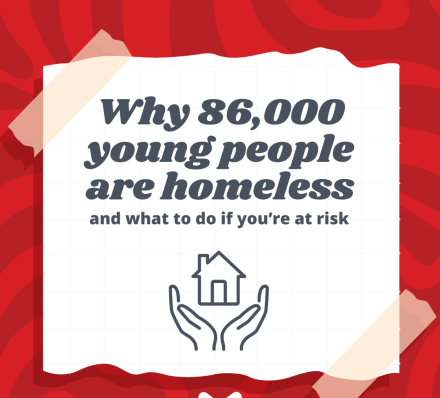86,000 young people between 16 and 24 are experiencing homelessness in the UK, according to research by Centrepoint. Over half (54%) left their last home because their parents, relatives or friends were no longer willing to accommodate them. In England, only 42% of young people who presented as homeless or at risk of homelessness received positive actions that prevented or dealt with their homelessness, and only 13% were accepted as statutorily homeless.
Why are so many young people homeless?
While anyone can be affected by homelessness at any age, some are at higher risk because of a mix of structural factors (problems in society) and individual factors (personal and family problems) that feed into each other.
?
Family conflict and violence
Conflict or violence in families can devastate young people and force them to leave home. Blended families (which include children from previous relationships) are particularly vulnerable to conflict, as are immigrant families adjusting to a new culture.
Family violence includes not only physical injury but also threats, sexual assault, emotional abuse, and any behaviour that causes someone in the family to live in fear. Young women are more likely to experience family violence.
Health and substance abuse problems
Mental health problems can both cause and be caused by homelessness. Homeless young people are often depressed and anxious about their future and safety, and feel that their lives are worthless. They may be traumatised from experiencing or witnessing neglect and abuse. Being homeless can also impact their physical health, making it harder to get their lives back on track.
Alcohol or drug abuse, either by the young person or by someone in their family, can also lead to homelessness, and can also start as a result of life on the streets.
?
Housing and income issues
Some families pressure young people to leave home because of financial problems or overcrowding. If the young person has nowhere else to go and no income sufficient to pay rent, they may become homeless.
Young people often use their networks to find someone to stay with, but this usually only works in the short term, and they eventually run out of sofas to sleep on. They may start sleeping rough or end up in foster care.
Without both accommodation and an income, young people have difficulty living independently. Finding enough money for a deposit and rent can be very challenging–leaving little for food, bills and transport–and the high cost of temporary accommodation like hotels and caravan parks makes matters worse. Landlords may also discriminate against young people, stereotyping them as irresponsible tenants.
If you feel you could offer help, understanding and advice, speak to us about becoming a homelessness support worker.
Click here to find out more about Vetro Housing.
?
If you’re at risk
If you are a young person needing advice, reach out to Shelter.
If you’re under 25 and you think you might become homeless in the next 56 days, your local council should treat you as threatened with homelessness. Here’s how to ask them for help.
If you’re leaving home to escape violence, abuse or threats, you should tell the council. They should never contact the person abusing you to ask if you can go home.
You can also contact The Mix to talk to someone confidentially about anything you’re struggling with. They’ll listen to you and look for other services that might help you.

